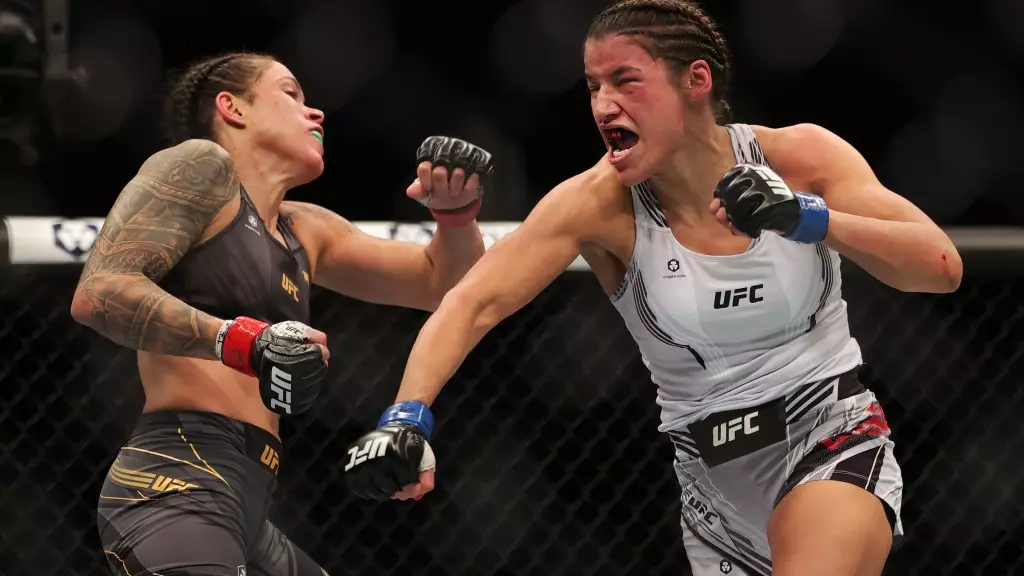Julianna Peña is stepping into the spotlight this weekend as she prepares to challenge Raquel Pennington for the UFC bantamweight championship at UFC 307. A seasoned athlete with a record of 12-5 in mixed martial arts and 7-3 within the UFC, Peña has often been labeled primarily as a grappler. While her ground game is indeed formidable, Miesha Tate, a former champion and close ally of Peña, emphasizes that her striking deserves more recognition than it currently receives.
Tate recently remarked on MMA Junkie Radio that Peña possesses an unconventional style of striking—reminiscent of jousting, where the impact comes from full force rather than snap. This metaphor suggests that Peña’s punches, though perhaps lacking in traditional finesse, can deliver significant power and effectively disrupt her opponents’ rhythm. It’s valuable insight that underlines a critical aspect of Peña’s skill set; her striking may not be mainstream, but it has its own unique potency that can catch competitors off guard.
Peña’s journey within the UFC is not just about her skills but also the relationships she has fostered along the way. Tate recognizes the importance of their shared history, having trained alongside Peña during the early stages of her career in Washington. This context deepens the analysis—Tate understands Peña’s potential better than many, having witnessed her evolution firsthand. Additionally, Tate’s coaching experience during “The Ultimate Fighter” Season 18 further cements her authority in whether Peña’s abilities truly extend beyond the mat.
In that same coaching tenure, Tate also worked with Pennington, creating a fascinating dynamic for this title fight. Assessing Peña’s striking capabilities alongside her history as a grappler creates a well-rounded perception of her abilities, leading to critical questions about how well Pennington can handle her offensive output. Unlike a typical striker who relies solely on clean techniques, Peña’s approach could disrupt and destabilize Pennington’s game if she finds her range early.
Turning to Raquel Pennington, Tate draws parallels between Pennington’s striking and that of the renowned Valentina Shevchenko. This comparison highlights Pennington’s methodical, defensive style, which is built around exploiting her opponents’ mistakes rather than initiating every exchange. Pennington’s prowess in defense and counter-striking solidifies her as a challenging opponent who doesn’t easily fall into traps.
The paradoxical approach of both fighters sets the stage for an intriguing tactical battle. While Peña may be eager to push the pace and land powerful strikes, Pennington’s precise and calculated responses can turn the tide if the match proceeds in her favor. This intersection of styles amplifies the stakes of the matchup, making the inevitable exchanges between them a spectacle of technical prowess and raw determination.
In terms of the outcome, Tate believes that the fight boils down to sheer willpower. She argues that Pennington’s durability will be tested against Peña’s aggressive mindset, which often leaves her prone to counterattacks. In grappling exchanges, Tate foresees Pennington needing to take the initiative.
If the fight goes to the ground, Peña’s advantage could quickly become evident. Tate warns, however, that should Peña achieve dominant positioning first, she has the capacity to drain her opponents and dictate the pace of the fight from there. This nuance hints that Pennington may need to adopt a more aggressive grappling strategy to ensure she remains in control and avoids giving Peña any breathing room.
As fight night approaches, the anticipation surrounding Peña’s striking and her clash with Pennington grows. Rooted in history, skill, and tactical dynamics, UFC 307 promises to be more than just a championship bout; it’s a fascinating narrative built on enduring rivalries, underappreciated techniques, and individual resolve. Whether Peña’s striking can catch Pennington off guard or the champion can leverage her skillful defense remains to be seen, leaving fans eager to witness this thrilling showdown unfold.
Ultimately, the layers of complexity in this matchup beg a deeper appreciation for what these athletes bring to the octagon—not merely as fighters but as embodiments of tenacity, skill, and character in a sport that constantly evolves.

